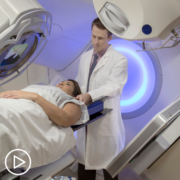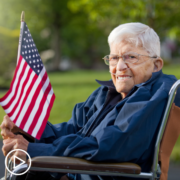Are There Lung Cancer Outcome Disparities for Veterans?
Are There Lung Cancer Outcome Disparities for Veterans? from Patient Empowerment Network on Vimeo.
Do lung cancer outcome disparities exist for veterans? Expert Dr. Drew Moghanaki from UCLA Health discusses veteran outcome studies for civilian versus VA healthcare, efforts on improving outcomes over time, and proactive advice for accessing the best lung cancer care.
[ACT]IVATION TIP
“…if you’ve got cancer, to really understand lung cancer, to really appreciate that there’s been a lot of advances and if you’re not feeling that you have access to those advances, get a second opinion and go to a bigger place that actually has an integrated approach to lung cancer care with a multidisciplinary team with the doctors in different specialties are working together and are focused on giving the best lung cancer care.”
Download Resource Guide | Descargar guía de recursos
See More from [ACT]IVATED NSCLC Veterans
Related Resources:
Transcript:
Lisa Hatfield:
Dr. Moghanaki, can you discuss any disparities or differences in health outcomes among veterans compared to the general population when it comes to lung cancer treatment?
Dr. Drew Moghanaki:
Yeah, when it comes to lung cancer treatment, there’s new data that’s showing that since the discovery of better drugs and safer surgery and more effective radiotherapy, that survival rates are improving gradually, especially over the last 10 years. We’ve seen this same trend with VA data as well, that veterans, whether they’re getting care in a community or in the VA, the outcomes are getting better.
Are there disparities? Well, there’s notable disparities that we’ve identified which is that although outcomes in general are getting better for female and male and Black and white and other ethnic sections of the population, there continues to be a disparity in the civilian sector in that our Black patients, whether civilian or veteran, have inferior outcomes. And, of course, we know this is associated largely with other socioeconomic issues related to a long history of racism in this country that’s led to segregation and unequal access to health care and well-being opportunities.
But what we see in the VA, whether you’re Black or white, actually the outcomes are the same. So there’s something that VA is doing that’s addressing the barriers that are affecting people in the general population. And in fact, we see in some of our studies, Black veterans actually have better outcomes. And so we’re learning that it’s much more than just biology by itself, that there really are socioeconomic factors. And when you’ve got a healthcare system that’s more than just a healthcare system, it’s a benefit system as well.
We really provide a nice safety net that helps address those disparities. But the sad truth is that it definitely disparities do continue to exist outside the VA healthcare system. So my activation tip is, if you’re a veteran with maybe some less resources than others, again, check into the VA because the VA provides not just healthcare, but also a lot of support services, especially when you have lung cancer, which as mentioned, is just very difficult to deliver and requires more than just access to a doctor.
Lisa Hatfield:
And I’d like to mention a paper also that you published regarding improving outcomes over a certain time period. There was a paragraph in there where you had a discussion about potential contributing factors to the improvement of outcomes over time. Are you willing to discuss those a little bit, what those potential factors are for improving outcomes in patients with lung cancer?
Dr. Drew Moghanaki:
Yeah, there are three main components. One is making sure you get the diagnosis right. Making sure you do the right biopsies and you send the specimens for what’s called biomarker testing to make sure you know what type of lung cancer. There’s now more than a dozen different types of lung cancer. And if you don’t get that biomarker test, you’re not going to know. You’re just going to be treated with standard therapy. If you get the biomarker testing, you can get personalized medicine with a drug that’s more likely to work and probably safer than the older conventional chemotherapies, which still has a role. But sometimes we can skip chemotherapy altogether and go directly to a targeted therapy.
The second big advancement comes in the treatment delivery itself. So surgical treatments are now much less invasive than ever before. In fact, many of our patients, they go to the operating room, they wake up with four Band-Aids, and half their lung is removed. Remarkable technology using robotic and video-assisted technologies. Same with radiotherapy.
Patients lay on a table and the machine, the very sophisticated machine just rotates around them, zaps these tumors. The patient can actually drive themselves back and forth to treatment and go home and and live their lives. We’ve got patients getting lung radiotherapy, and they’re playing golf the next day. It’s unbelievable. And then the third really comes down to survivorship, which is that our patients, even if we really can’t cure their cancer, like a lot of advanced diabetes, we just can’t cure, we can keep our patients going as they live a high-quality life moving forward and make sure that their journey, unfortunately, with their lung cancer that they obviously didn’t ever want to have, that their journey is the best that it can be.
So my activation tip here is if you’ve got cancer, to really understand lung cancer, to really appreciate that there’s been a lot of advances and if you’re not feeling that you have access to those advances, get a second opinion and go to a bigger place that actually has an integrated approach to lung cancer care with a multidisciplinary team were the doctors in different specialties are working together and are focused on giving the best lung cancer care.
Share Your Feedback
Create your own user feedback survey











